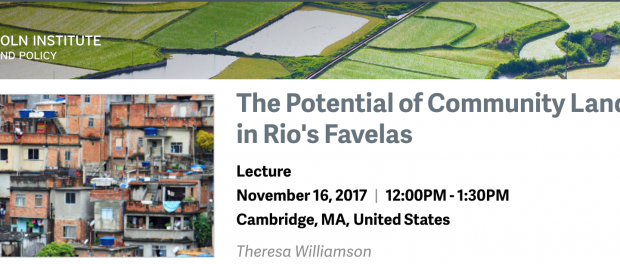Join Us: The Potential of Community Land Trusts in Rio’s Favelas
“The Potential of Community Land Trusts in Rio’s Favelas”
Join Catalytic Communities‘ Executive Director Theresa Williamson at the Lincoln Institute of Land Policy in Cambridge, MA this Thursday at noon.
Please spread the word to your Boston area contacts.
Register Here.
About the Talk:
Rio de Janeiro is home to some 1000 favela communities, the vast majority situated on public lands. Under Brazil’s 1988 Constitution, adverse possession rights were guaranteed, yet on public lands, full land rights would not be ceded and only use rights permitted, until recently. Under new laws, the privatization of federal property is now being allowed, and the floodgates may open for favela communities claiming full land rights on federal lands.
In Rio de Janeiro, the oldest–and original–favela community in Brazil, known as Providência, is turning 120 this month. Over more than a century, community-orchestrated development unregulated by government has been the norm across Rio’s favelas, as a result of neglect and repression. Without alternative forms of housing, over a century Rio’s favelas have developed on their own, and often into incredibly resilient hotbeds of resistance. They have also, in many ways, through their own organic approach to growth, developed urban assets associated with sustainable development, and strong social and economic networks that thrive through flexibility and innovation. Some favelas have become quite consolidated. By some accounts, favelas as a whole comprise the bulk of Rio de Janeiro’s affordable housing.
During the recent economic boom years in Rio de Janeiro (2008-2013), when favelas experienced the triple conditions of economic growth, increased security, and public investment, some consolidated, centrally located favelas saw increases in better-off outsiders coming to live there — even showing signs of gentrification, like the opening of middle- and even upper-class businesses. Meanwhile, 80,000 favela residents were forcibly evicted from their homes in the lead up to the Olympics. Many other favelas across the city, including in the city’s dramatically underserved North Zone, were displaced due to significant cost of living increases, primarily due to increasing rents. Vulnerable residents across the city’s favelas were thus forced out of their lifelong communities.
During this period, advocacy planner Theresa Williamson and her organization, Catalytic Communities (CatComm), began researching approaches that could help secure legal rights for favela communities that would allow them to remain in their homes without accidentally tipping them into the formal and highly speculative market, and thus lead to an ultimate unintentional demise. One conclusion is that although legalizing favelas’ claims is essential, this should not come hand-in-hand with compromising the qualities communities had developed as they followed an informal development pattern. Strategies that allow favelas to recognize the assets they had effectively developed, and then engage those assets in addressing their many challenges, should be developed. In this search, they began exploring the Community Land Trust model and what it would look like if applied to Rio’s favelas.
Could a Favela CLT provide a model for formalizing favelas and disentangling them from the prejudices induced by their lack of regularization, without compromising their affordability? Could it offer a model for securing land rights that concurrently respects both the collective and individualistic natures and needs of favelas and their residents, and that builds on residents’ desire for permanence? In contrast to mismanaged, temporary or low-quality public programs, CLTs could allow favela residents to take control of their own investment.
Williamson will describe her own, CatComm’s, and their community and legal partners’ current understanding of the potential, hurdles, and approaches to establishing CLTs in Rio’s favelas, and will expand on this concept with help from audience members during an extensive dialogue to follow.
About Theresa:
Dr. Theresa Williamson, a city planner, has been executive director of Catalytic Communities (CatComm) since founding the favela advocacy organization in Rio de Janeiro in 2000. She is an outspoken and respected activist and speaker on Rio de Janeiro’s favelas working to ensure they are recognized for their heritage status and their residents fully served as equal citizens. She is editor-in-chief of RioOnWatch, CatComm’s internationally recognized sustainable urbanism watchdog news site and favela news service regarded for its work in informing and influencing international journalists covering the Olympics, and local debates on housing in Rio. She has published four opinion pieces in The New York Times and received the 2012 NAHRO John D. Lange International Award for her contributions to the international housing debate and the 2005 Gill-Chin Lim Award for Best Dissertation on International Planning. Dr. Williamson earned her B.A. in Biological Anthropology from Swarthmore College and her Ph.D. in City and Regional Planning from the University of Pennsylvania.

